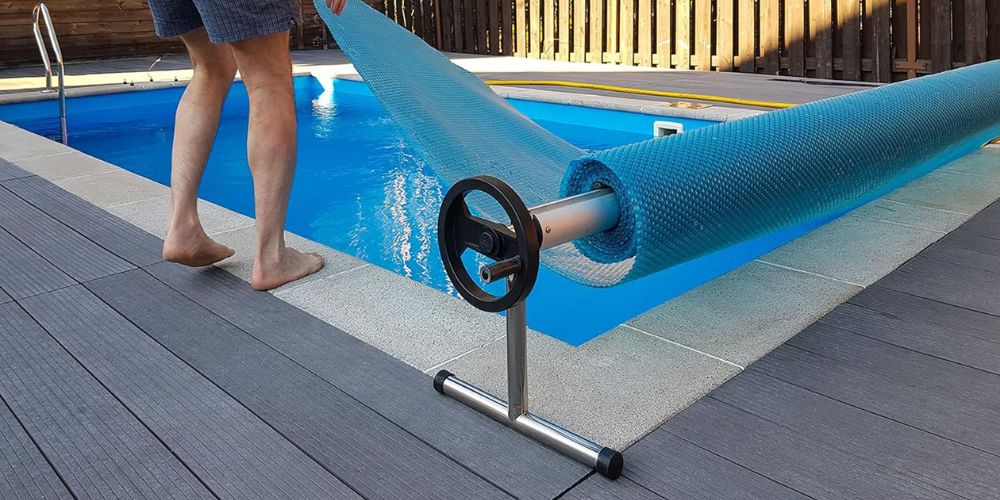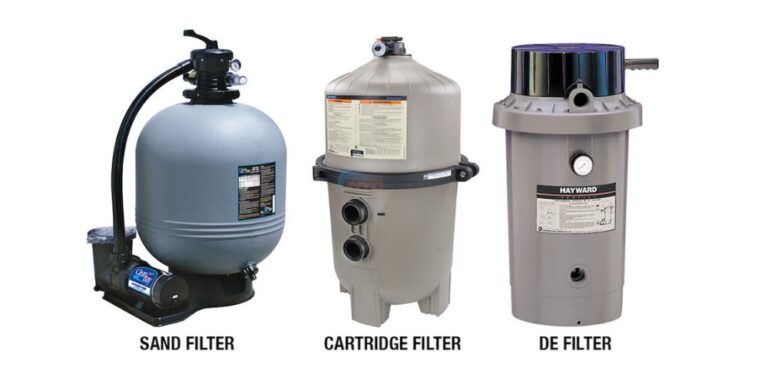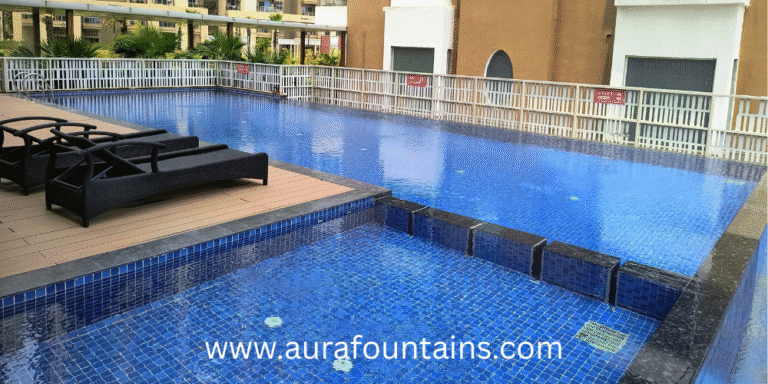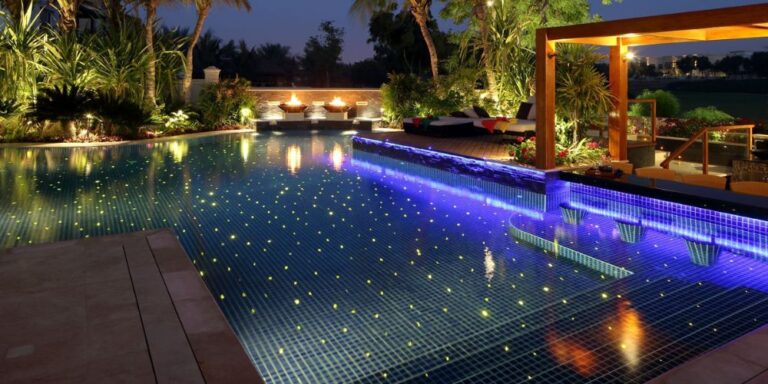Swimming pools offer a refreshing escape from the summer heat, but they also require regular maintenance to keep the water clean and safe. One of the most effective ways to ensure that your pool stays in optimal condition when not in use is by investing in a high-quality pool cover. Pool covers are more than just a convenience—they are an essential component of pool care, offering protection, safety, and energy savings. In this guide, we will walk you through the different types of pool covers, their benefits, and important factors to consider when choosing the best cover for your swimming pool.
Types of Swimming Pool Covers
There are several types of swimming pool covers available, each designed to serve specific needs. Let’s explore the most common types:
1. Solar Pool Covers
Solar pool covers are designed to absorb sunlight and use the energy to heat your pool water. Made of a special type of plastic (usually polyethylene), they have air pockets that trap the heat from the sun, helping maintain the pool temperature. Solar covers are available in a variety of thicknesses, offering different levels of heat retention.
Benefits:
- Energy-efficient: Helps reduce heating costs by harnessing solar power.
- Reduces evaporation: Prevents water loss due to evaporation, keeping the pool filled with water.
- Keeps debris out: While primarily designed for heating, solar covers also help keep leaves and debris out of the pool.
Considerations:
- Manual operation: Most solar covers need to be manually rolled up or unrolled, though automatic reels are available at an additional cost.
- Limited durability: While effective for heating, solar covers may wear out faster than other types of pool covers due to exposure to UV rays.
2. Safety Pool Covers
Safety pool covers are designed with the primary goal of providing protection for children and pets. These covers are typically made from durable materials such as mesh or solid vinyl, and they are designed to withstand the weight of a person or animal. Some safety covers are powered by a motor, while others are manually installed.
Benefits:
- Safety: Prevents accidental falls into the pool, making it a must-have for homes with children or pets.
- Durability: Made from heavy-duty materials that last longer, even in harsh weather conditions.
- Easy maintenance: Mesh covers allow water to drain through, preventing the buildup of rainwater or debris.
Considerations:
- Higher cost: Safety covers tend to be more expensive than basic pool covers due to their construction and added safety features.
- Installation complexity: Some safety covers require professional installation, especially if you opt for an automatic version.
3. Mesh Pool Covers
Mesh pool covers are made from durable, tightly-woven fabric that allows water to pass through while keeping out larger debris like leaves and twigs. These covers are ideal for pools in areas that experience a lot of rainfall, as the mesh allows for rainwater to drain off, preventing the cover from becoming weighed down.
Benefits:
- Drainage: Water drains easily through the mesh, reducing the risk of damage from rain accumulation.
- Lightweight: Easy to install and remove compared to solid covers.
- UV resistant: Mesh covers are designed to resist UV damage and last longer than other fabric covers.
Considerations:
- Does not block sunlight completely: Although effective at keeping out debris, mesh covers do not offer the same level of insulation as solid covers, so they don’t trap heat as well.
4. Solid Pool Covers
Solid pool covers are typically made from vinyl or other heavy-duty materials. They provide a complete barrier to debris and prevent sunlight from entering the pool, helping to keep the water temperature steady. Unlike mesh covers, solid covers prevent any water from seeping through, which can be an advantage in some situations.
Benefits:
- Total protection: Offers full coverage, keeping debris, dirt, and leaves out of the pool.
- Energy savings: Helps maintain the pool’s temperature by blocking out sunlight and reducing evaporation.
- Improved cleanliness: Solid covers prevent algae growth and help keep the water clear by blocking contaminants.
Considerations:
- Water accumulation: Since water cannot drain through solid covers, they may require a pump to remove rainwater that accumulates on top.
- Heavy and difficult to handle: Solid covers are bulkier and can be harder to remove and store, especially during the off-season.
Key Considerations When Choosing a Pool Cover
When selecting a pool cover, several factors should guide your decision. Here are some important considerations to keep in mind:
1. Climate and Weather Conditions:
-
- In areas with harsh winters or heavy rainfall, you might want to opt for a more durable, solid cover that can handle snow and water accumulation.
- For warmer climates, a solar cover may be more beneficial to maintain pool temperatures and reduce energy costs.
2. Safety Needs:
-
- If you have children or pets, a safety pool cover should be a top priority. Make sure to choose one that meets the required safety standards for your region.
3. Ease of Use:
-
- Consider how easy the cover is to remove and install. Automatic covers are convenient but come at a higher price, while manual covers may require more effort but are typically more affordable.
4. Material Durability:
-
- Look for a pool cover made from high-quality materials that can withstand prolonged exposure to UV rays, harsh weather, and chemicals. Durability is key to ensuring long-term use.
5. Maintenance Requirements:
-
- Some covers, especially solid ones, require more maintenance due to water accumulation. Consider the maintenance needs of the cover before making your choice.
Aura Fountains
Aura Fountains specializes in creating elegant, customizable water features that enhance the beauty and ambiance of swimming pools and outdoor spaces. Known for innovative designs, they offer high-quality solutions that complement pool areas, providing both aesthetic appeal and functional benefits like cooling the air and improving the environment. For swimming pool contractors, their designs offer the perfect addition to any project, adding a touch of elegance and tranquility to both residential and commercial pools, making the swimming pool experience even more enjoyable.
Conclusion
A swimming pool cover is an essential investment that helps maintain the cleanliness, safety, and efficiency of your pool. With various types of pool covers available—solar, safety, mesh, and solid—it’s important to select the right one based on your needs, climate, and budget. Whether you prioritize safety, energy savings, or ease of maintenance, the right pool cover can enhance your swimming experience while extending the life of your pool. By considering all factors, you can choose the best cover to protect your pool and enjoy a cleaner, safer, and more energy-efficient swimming environment.
Don’t miss: Explore Pool Filter Systems: Types, Pros & Cons





